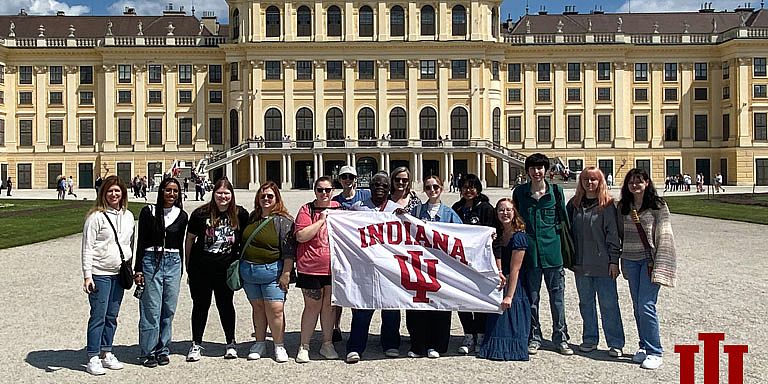KOKOMO, Ind. — As part of her KEY experience at Indiana University Kokomo, Malori Adler was able to gain an in-depth look at how psychology and criminal justice work in two European countries.
Adler was one of 12 students who traveled to Vienna, Austria, and Amsterdam, Netherlands, this summer as part of a comparative mental health class.
“One of the important things we have to strive for as psychologists, or anyone who works with the public, is a very high level of cultural adaptability,” said Adler, a fourth-year psychology major from Logansport. “It’s important to know how other people live and how they have values that differ from ours. In a field that involves interacting with and understanding people, it’s beneficial to know all of the different cultures and environments the people you work with may be involved in.”
Rosalyn Davis, professor of clinical psychology and director of the master’s program in mental health counseling, and Cathy Holcomb, associate professor of psychology, led the 10-day trip, which included visits to Neustadt, an Austrian nonprofit that provides probation, victim-offender mediation, electronic monitoring and other social service services; museums of renowned psychologists Viktor Frankl and Sigmund Freud; the Hoogewijk Dementia Village near Amsterdam; and the Anne Frank House.
“In class, we learn about mental health services, costs, treatment protocols, and looking at it from a global perspective,” Davis said. “Some places are doing it well, but some places could do better.”
One of the most impactful places they visit is Hogeweyk Dementia Village, which provides a home-like atmosphere for dementia patients: they are placed in homes according to their personality and have access to grocery shopping, bars, parks and other services.
“They’re living their best life here, and they just happen to have dementia,” Davis says. “If you didn’t know better you’d think this was a retirement centre for seniors. In the US, they’re closed and the hours you can visit are heavily regulated. Here, family members can watch over them for the day and do whatever they want within the facility, and it’s very large. We have a lot of discussions about why we can’t provide this experience for our people.”
Adler, who is minoring in criminal justice, was particularly interested in the rehabilitation efforts led by Vienna’s Neustadt program and how it handles domestic violence cases, where potential domestic abusers are actively isolated from their homes for two weeks, she said.
“My family has been involved in situations like that and I think we would have benefited from a program like that,” she said. “It gave me ideas about what I can do to help people be safer. I think it was a very beneficial experience.”
Davis said New Start gives students ideas about different ways to navigate criminal justice, with a particular focus on comprehensive rehabilitation services for people incarcerated. Helping clients get an education, find work and secure housing helps prevent them from reoffending, he said, adding that the recidivism rate is about 15 percent.
“Students learn that the world is much bigger than they think it is,” she says, “and that they may not have thought about how people in other countries do this and what it means for them to do things differently than we do.”
Holcomb said the trip gives students an opportunity to think about health care options they may not have considered before.
“I think it’s important for students to be able to see a different perspective that you can only get by traveling and seeing it first-hand,” she said. “We have a lot of students at our school who haven’t traveled much, so it’s especially important for them. They see that there are other ways of dealing with mental health, aged care, prison and post-prison life.”
“We hope this program gives students ideas about different approaches,” Holcomb said. “It’s not one size fits all, and students can apply what they learn to their own experiences, whether that’s in the mental health field or in their own lives. We hope this program sparks and continues an interest in students to travel and see other cultures.”
Davis said he is grateful to donors who provided scholarships that made the trip possible for so many students.
“This is one way that if anyone in the community is thinking about how to make an impact on someone’s life,” she said. “Being able to go on these international trips may be a once in a lifetime event for many of them, and they all need support to get there.”
The trip is part of the IU Kokomo Experience and You (KEY) program, which provides students with real-world experiences, connections with people and travel experiences across many majors. Destinations have included important World War II sites in Germany, France and England, a business incubator in Nashville, Google headquarters in California, Indiana Dunes National Park, ESPN in North Carolina and a behind-the-scenes look at security at Gainbridge Fieldhouse in Indianapolis.
At Indiana University Kokomo, education is key.


